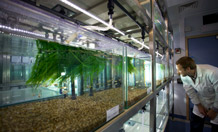
Geoffrey Pope laboratory
World-class biosciences building
Biologists can now visit any aquatic environment in the world, without leaving Exeter.
A new facility, featuring over 600 fish tanks in 14 rooms, will enable research and teaching on climate change, the effects of pollution and even human health.
The £26 million refurbished Geoffrey Pope building, home to the University’s Biosciences department, officially opened on Monday 12 December. Along with other new state-of-the-art equipment, including a DNA sequencer and bioimaging suite, this facility will boost Exeter’s reputation for world-class science research and teaching.
The Aquatic Resources Centre (ARC) houses populations of fish and marine invertebrates. Its 18 separate systems can precisely control the type and temperature of water. This enables scientists to recreate just about any freshwater or marine environment on Earth and even create the environments of the future, with higher sea temperatures as a result of predicted climate change. Lighting systems mean researchers can simulate different daylight hours and seasons.
Through this new facility, the University of Exeter will enhance its reputation for research on the effects of climate change and the impact of pollution on natural ecosystems. The University also aims to further our understanding of the impact of pollutants, such as pharmaceuticals, on human health and reproduction by studying their effects on fish model systems.
The refurbished building also houses the Wolfson Imaging Unit, a suite with state-of-the-art optical, laser and electron microscopes and image analysis software, made possible through generous support from the Wolfson Foundation. This will enable staff and students to visualise cell growth and division and observe how disease-causing pathogens impact on individual cells. To further its research on how human and animal bacterial pathogens cause disease, the University has also invested in a new laboratory which facilitates the safe handling of these bacteria.
In the last five years, rapid advances in DNA sequencing technologies have dramatically pushed back boundaries of what is possible in many areas of biology. In partnership with the Peninsula Medical School, the University has commissioned an Illumina HiSeq 2000 sequencer capable of generating huge sequence data for unprecedented insights into the genomes of organisms.
Professor in Environmental Biology Charles Tyler of the University of Exeter said: “Our fantastic new facilities means we can observe how aquatic organisms live, grow and adapt in any environment in the world. We can look at life forms at a cellular level and sequence whole genomes to help better understand how organisms work. We can move a step closer to combating some of the world’s most significant diseases, by understanding how pathogens operate.
Together, these new facilities will teach us much about life on Earth and how we and other species are being affected by disease, pollution and climate change.”
Many of these new facilities are already being used by undergraduate and postgraduate biosciences students, enabling them to carry out research in world-class laboratories.
Rebecca Shellock, 3rd year BSc Biology and Animal Behaviour University of Exeter said: “The facilities in the Aquarium are second to none, students both now and in the future from all different biological backgrounds have a real opportunity to gain much needed laboratory experience. This year, I have been working in the aquarium carrying out research for my third year project into the effect of habitat enrichment on the physiology and behaviour of the model species, the Zebrafish. At no other university, could a student such as me have such amazing resources at my fingertips - I have a room to myself to carry out behavioural observations and there is always a wealth of staff support and knowledge. Due to the range of facilities, there is a such a large diversity of research which has and will inspire students to get involved in further research opportunities in the aquarium and to carry on into further study such as masters and PhDs.’’
This project is funded through the University of Exeter’s £230 million investment in science, medicine and engineering across five themes, one of which is Systems Biology. This growing area of biosciences brings together techniques from mathematics and physics to understand subcellular processes, individual organisms and entire ecosystems.
Date: 13 December 2011
